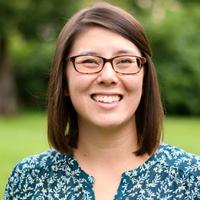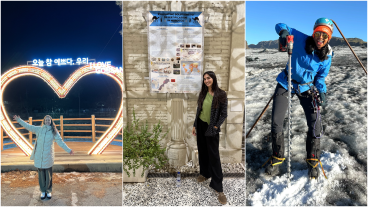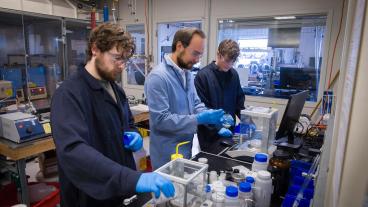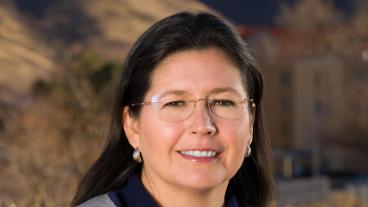Mines Online poised for growth under university’s first assistant vice president for online education
Sam Spiegel, executive director of Trefny Center for Innovative Instruction, took on the new role earlier this year
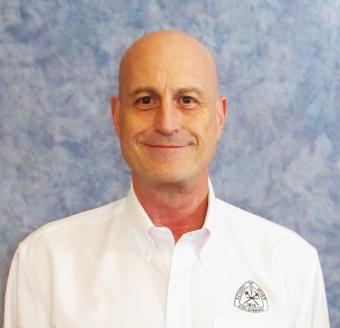
Sam Spiegel has been named Assistant Vice President for Online Education at Colorado School of Mines, the university’s first-ever leadership position dedicated to the growth and expansion of Mines’ online offerings.
Spiegel, who joined Mines in 2015, previously served as executive director of the Trefny Center for Innovative Instruction, which proactively supports Mines faculty in the implementation of evidence-based practices for teaching and learning on campus. In his new role, he will oversee all of Mines Online’s education programs, including adult learning, continuing professional education, academic courses and degree/certificate programs.
“Colorado School of Mines is excited to announce that Sam Spiegel will be our first assistant vice president for online education, a role to which he will bring a wealth of experience and expertise in pedagogy, operations and the national landscape of online education,” said John Bradford, Vice President for Global Initiatives at Mines. “Under Dr. Spiegel’s leadership, the goal of Mines Online is to make a high-quality education accessible to more people around the world throughout their professional lives. We want to provide a Mines experience on an online platform.”
Spiegel brings to the role more than 20 years of both teaching and leadership in online education, specifically with a STEM focus. Before coming to Mines, he served as chair of the Disciplinary Literacy in Science Team at the Institute for Learning (IFL) and as associate director for the Swanson School of Engineering’s Engineering Education Research Center at the University of Pittsburgh. He also worked as a science educator, director of research and development for a multimedia development company, and as director of education at the National High Magnetic Field Laboratory at Florida State University.
Spiegel holds a PhD and MS in Curriculum and Instruction from Florida State University and a BS in biological sciences from Florida Atlantic University. In 1997, the Association for the Education of Teachers of Science honored Spiegel for his efforts in teacher education with the Innovation in Teaching Science Teachers Award.
“Colorado School of Mines is at a critical threshold with its online programs. We built the right foundation, we’re getting the resources aligned, but we’re still very new to this. We were just fully accredited by the Higher Learning Commission (HLC) to offer online degrees this past summer,” Spiegel said. “We have an amazing opportunity to learn from others and come in with a new perspective and think about innovating. I have a long-standing passion for advancing and enhancing education, and I am honored to lead Mines Online during this exciting time.”
As Assistant Vice President for Online Education, Spiegel will lead a Mines Online “incubator” out of the Office of Global Initiatives and Business Development. The incubator will work in close coordination with Academic Affairs, academic departments and faculty, the Trefny Center and support services across campus, all with the goal of establishing Mines as the leader in online science and engineering education for STEM professionals in a stimulating, interactive and effective virtual environment.
In 2018, Mines launched an online non-thesis master’s degree and graduate certificate in Space Resources, the first program of its kind in the world. Mines received full online accreditation in the summer of 2020. Since then, another 17 online programs have been launched, including a professional master’s degree in Mining Engineering and Management and graduate certificates in Petroleum Data Analytics, Finite Element Analysis (FEA) Professional, Additive Manufacturing, GIS Informatics and more.
“We’re really trying to build out our online offerings to provide learning opportunities to people throughout their professional life and beyond,” Bradford said. “That means having a continuum of short courses, super schools, bootcamps, certificates, non-thesis master’s degrees and online self-study modules they can access at low cost. We know the landscape of higher education is headed in that direction. To remain relevant, we need to stake a claim online.”
Spiegel has been engaged in the planning and implementation of Mines Online since its inception in 2017. In this new role, his goals include creating a more streamlined process for faculty, advancing promotion and recruiting efforts, seeking new partnerships and ways to innovate programs, and reducing some of the barriers that prospective students currently have to starting an online program.
“Online education gives us the opportunity to reach new student populations and support our alumni and other students in new ways, ways that are more modern, ways that provide more flexibility,” Spiegel said. “Our challenge is how do we build out this portfolio where students can come to Mines from a variety of life and career stages and create flexible pathways to learn about things that excite them and advance their careers.”
To meet this challenge, Mines will offer a variety of online professional learning opportunities, stackable online micro-degree programs, online certificate programs, and online master’s degrees to complement its in-person offerings.
Under this new paradigm, online programs are a valuable tool to support students where they are physically and cognitively, Spiegel said. At Mines, faculty work with designers to build online courses collaboratively, instead of just passing off the content to a designer who builds a course on their behalf.
“It’s the difference between writing a harlequin novel and a Pulitzer Prize-winning novel. In the harlequin model, which is what a lot of places that churn out big-volume courses do, it’s the same thing every time – you’re just changing the scenery and names of places. Our designs are driven by learning outcomes and educational research. We use a sophisticated design process we call Engineering Learning to ensure the course is really supporting students as they master the intended outcomes,” Spiegel said. “We want to take advantage of the strength of our amazing Mines faculty and make sure our online courses are really creating that instructor-student interaction.”
For more about Mines Online, program offerings and admissions requirements, go to https://online.mines.edu/.

